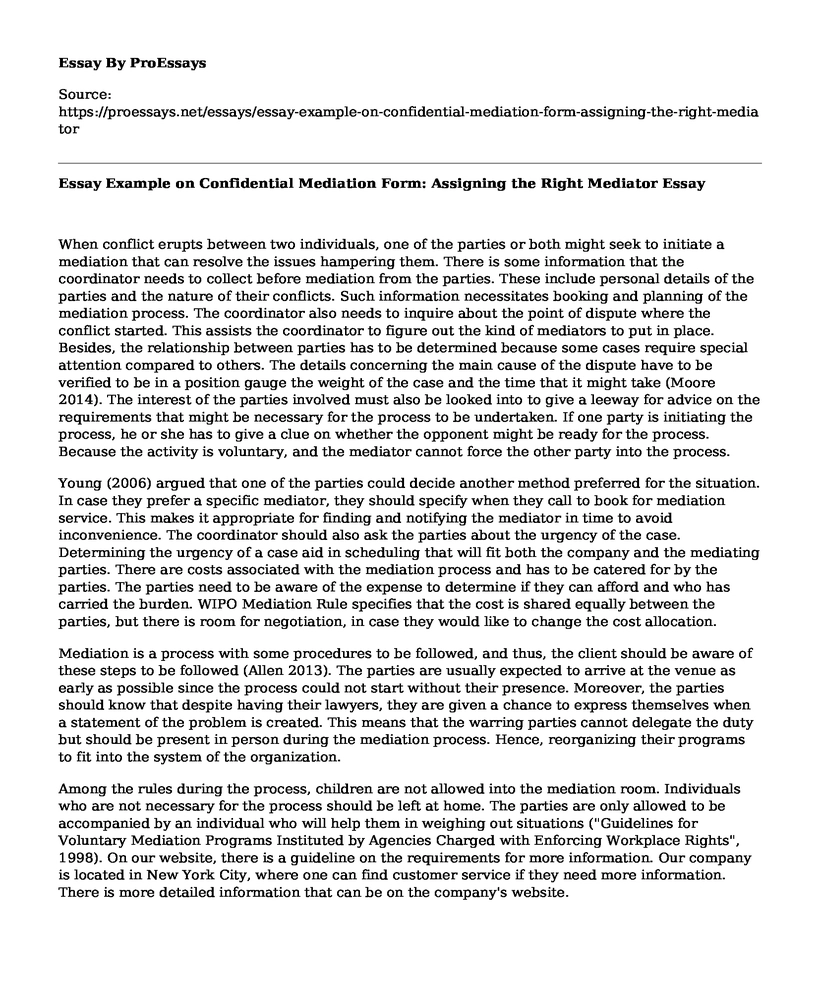When conflict erupts between two individuals, one of the parties or both might seek to initiate a mediation that can resolve the issues hampering them. There is some information that the coordinator needs to collect before mediation from the parties. These include personal details of the parties and the nature of their conflicts. Such information necessitates booking and planning of the mediation process. The coordinator also needs to inquire about the point of dispute where the conflict started. This assists the coordinator to figure out the kind of mediators to put in place. Besides, the relationship between parties has to be determined because some cases require special attention compared to others. The details concerning the main cause of the dispute have to be verified to be in a position gauge the weight of the case and the time that it might take (Moore 2014). The interest of the parties involved must also be looked into to give a leeway for advice on the requirements that might be necessary for the process to be undertaken. If one party is initiating the process, he or she has to give a clue on whether the opponent might be ready for the process. Because the activity is voluntary, and the mediator cannot force the other party into the process.
Young (2006) argued that one of the parties could decide another method preferred for the situation. In case they prefer a specific mediator, they should specify when they call to book for mediation service. This makes it appropriate for finding and notifying the mediator in time to avoid inconvenience. The coordinator should also ask the parties about the urgency of the case. Determining the urgency of a case aid in scheduling that will fit both the company and the mediating parties. There are costs associated with the mediation process and has to be catered for by the parties. The parties need to be aware of the expense to determine if they can afford and who has carried the burden. WIPO Mediation Rule specifies that the cost is shared equally between the parties, but there is room for negotiation, in case they would like to change the cost allocation.
Mediation is a process with some procedures to be followed, and thus, the client should be aware of these steps to be followed (Allen 2013). The parties are usually expected to arrive at the venue as early as possible since the process could not start without their presence. Moreover, the parties should know that despite having their lawyers, they are given a chance to express themselves when a statement of the problem is created. This means that the warring parties cannot delegate the duty but should be present in person during the mediation process. Hence, reorganizing their programs to fit into the system of the organization.
Among the rules during the process, children are not allowed into the mediation room. Individuals who are not necessary for the process should be left at home. The parties are only allowed to be accompanied by an individual who will help them in weighing out situations ("Guidelines for Voluntary Mediation Programs Instituted by Agencies Charged with Enforcing Workplace Rights", 1998). On our website, there is a guideline on the requirements for more information. Our company is located in New York City, where one can find customer service if they need more information. There is more detailed information that can be on the company's website.
References
Allen, H. (2013). Confidentiality: A Guide for Mediators. CEDR. http://www.communicationandconflict.com/impartiality.htmlMoore, C. W. (2014). The Mediation Process: Practical Strategies for Resolving Conflict. John Wiley & Sons.
Guidelines for Voluntary Mediation Programs Instituted by Agencies Charged with Enforcing Workplace Rights. Mediate.com. (1998). Retrieved 17 March 2020, from https://www.mediate.com/articles/spwork.cfm.Young, P. (2006). The "What" of Mediation: When Is Mediation the Right Process Choice? http://www.mediate.com/articles/young18.cfm
Cite this page
Essay Example on Confidential Mediation Form: Assigning the Right Mediator. (2023, Apr 24). Retrieved from https://proessays.net/essays/essay-example-on-confidential-mediation-form-assigning-the-right-mediator
If you are the original author of this essay and no longer wish to have it published on the ProEssays website, please click below to request its removal:
- Importance and Impact of Good Leadership and Management Skills Essay
- Theory of Motivation Essay Example
- Application for Child Life Specialist Internship Paper Example
- Essay Sample on Working at County Clerk's Office
- Essay Sample on Effective Communication in the Diverse Workplace
- Developing Career Success: Academic Studies to Productivity - Essay Sample
- Essay on Understanding Starbucks' Business Performance: Stakeholders, External Factors & Complexities







